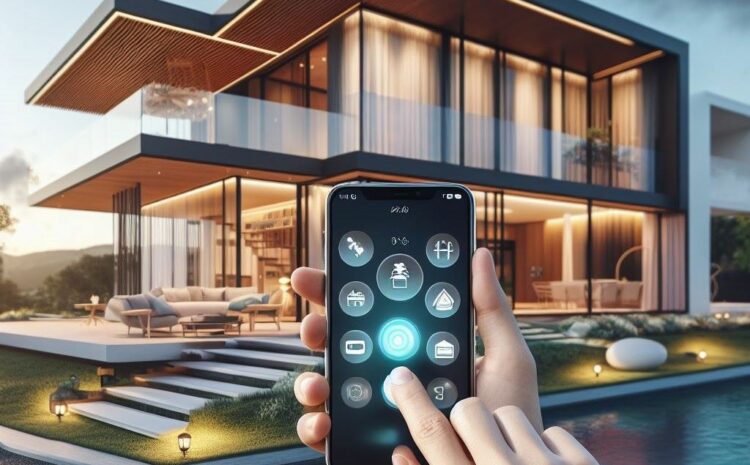
Smart Home Construction: Building the Ultimate Smart Homes with DesignBuild.Villas
Smart Home Construction: Building the Ultimate Smart Luxury Homes with DesignBuild.Villas
Table of Content
- Smart Home Construction: Building the Ultimate Smart Luxury Homes with DesignBuild.Villas
- Smart Home Foundations: An Overview
- The Automation Revolution: Enhancing Home Life
- Building the Future: The Role of Smart Home Technology
- The Intelligent Thermostat: Optimizing Comfort and Energy Efficiency
- Security Reinvented: Smart Home Security Systems
- Innovative Living: The Smart Kitchen Experience
- The Rise of Smart Lighting Systems
- Notification Systems: Staying Connected and Informed
- Custom Homes, Smart Living: Tailoring Technology to Your Needs
- Conclusion: Embracing Smart Living for a Better Tomorrow
- Frequently Asked Questions
- Q: What is a smart home and why should I consider building one?
- Q: How can a builder help me create a smart home?
- Q: What are some popular smart home systems that I can incorporate into my new home?
- Q: How can I automate my home with smart technology?
- Q: What are the advantages of building a smart house with a professional home builder?
- Q: What air conditioning systems are compatible with smart home automation?
- Q: How can I remotely control my smart home heating and cooling systems?
- Q: What should I consider when building a smart home network?
- Q: What are some commonly used smart home products that builders need to incorporate during construction?
- Q: Why are smart homes increasingly popular among new home buyers?
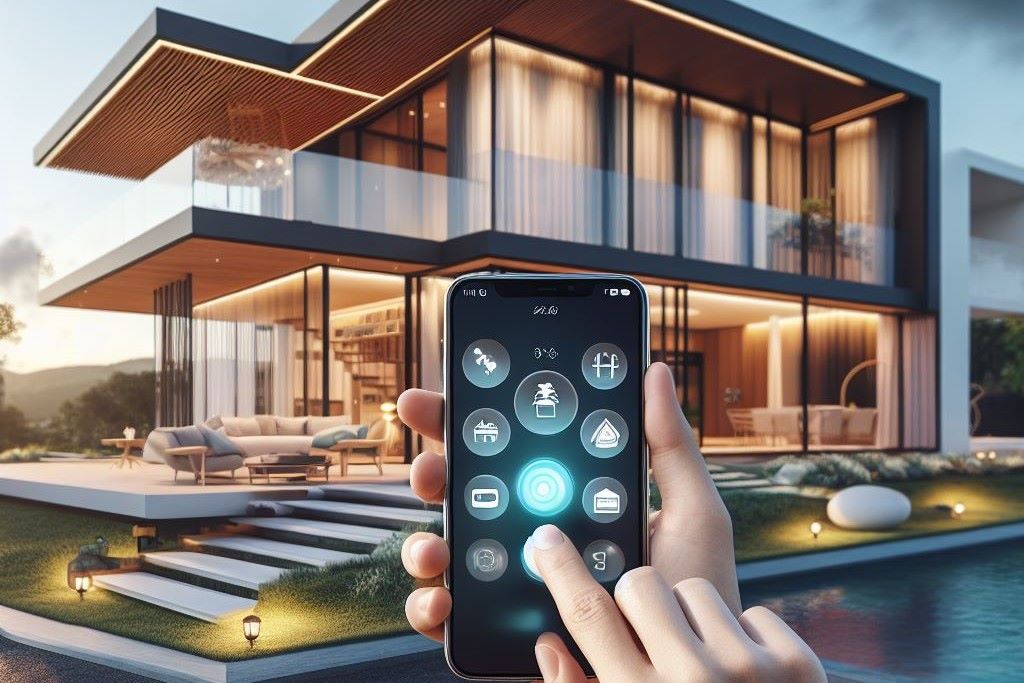
Step into the future with the marvels of smart home construction. In this article, we explore the seamless integration of cutting-edge technology into the very foundations of your living space. We will delve into the world of home automation, smart technologies, and the revolutionary changes they bring to the concept of luxury homes. DesignBuild.Villas understands the importance of integrating smart home technology into new home construction projects, creating homes that are efficient, secure, and convenient for homeowners.
Smart Home Foundations: An Overview
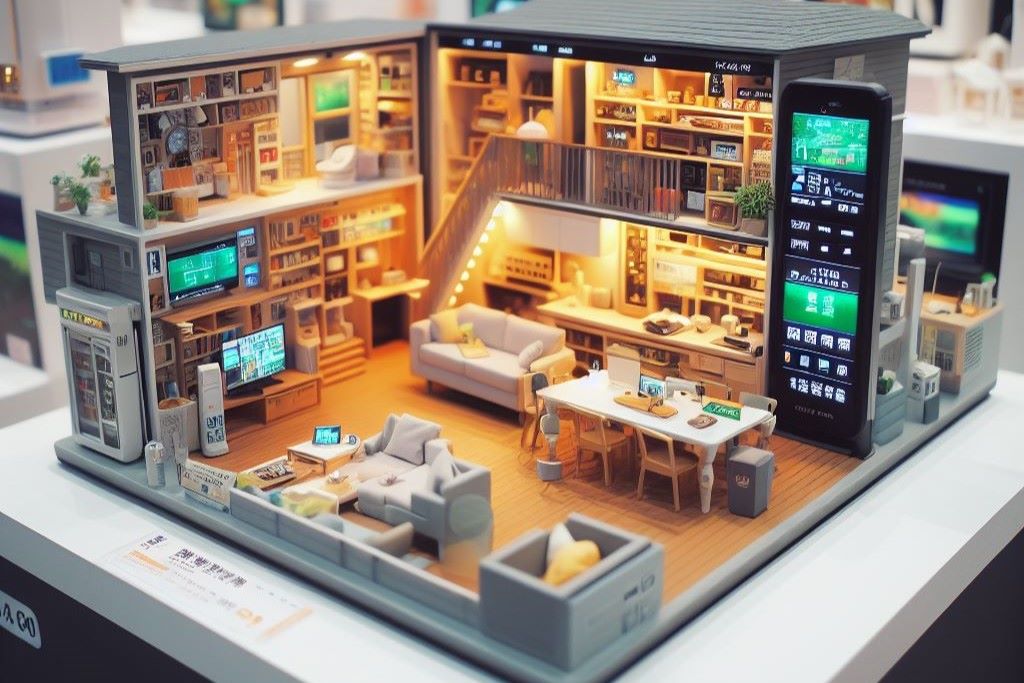
What makes a home “smart”?
A smart home is a residence that uses internet-connected devices to enable the remote monitoring and management of appliances and systems, such as lighting, air-conditioning, water heating, security system, music system and TVs. Smart homes can be controlled via a smartphone or a computer, allowing homeowners to control their home from anywhere in the world. This technology can also enable the automation of various tasks, such as turning off lights when no one is in the room or adjusting the temperature based on the homeowner’s preferences.
There are many benefits to having a smart home, including increased energy efficiency, improved security, and added convenience. For example, smart thermostats can learn the homeowner’s schedule and adjust the temperature accordingly, saving energy and money. Smart locks and security cameras can provide peace of mind by allowing homeowners to monitor their home and control access remotely.
As technology continues to advance, smart homes are becoming more accessible and affordable for homeowners. With the increasing popularity of virtual assistants like Amazon Alexa and Google Assistant, smart homes are becoming more integrated and user-friendly.
Overall, smart homes are revolutionizing the way we live, offering homeowners greater control, convenience, and peace of mind.
How does smart home construction redefine traditional building practices?
Smart home construction integrates modern technology into the building process, enabling automation and advanced connectivity throughout the home. The construction of a smart home begins with the incorporation of smart building materials and systems. These materials and systems are designed to enhance the functionality and efficiency of the home, while also providing a seamless integration of technology.
One of the key aspects of smart home construction is the use of smart building materials, such as sensors, and other smart devices, which can be embedded into the structure of the home. These materials can monitor and control various aspects of the home, such as temperature, lighting, security, and energy usage.
In addition to smart building materials, smart home construction also involves the installation of smart systems, such as heating, ventilation, and air conditioning (HVAC) systems, as well as lighting and security systems. These systems can be controlled and managed through a centralized platform, such as a smartphone or tablet, allowing homeowners to monitor and manage their home from anywhere.
Furthermore, smart home construction also involves the integration of advanced connectivity technologies, such as Wi-Fi, and Bluetooth, which enable seamless communication between various smart devices and systems within the home. This connectivity allows for the creation of a truly interconnected and intelligent home environment.
Smart home construction is revolutionizing the way homes are built, by incorporating modern technology to create homes that are more efficient, secure, and convenient for homeowners. With the continued advancement of smart home technology, the possibilities for smart home construction are endless, and the future of home building looks brighter than ever.
The Automation Revolution: Enhancing Home Life
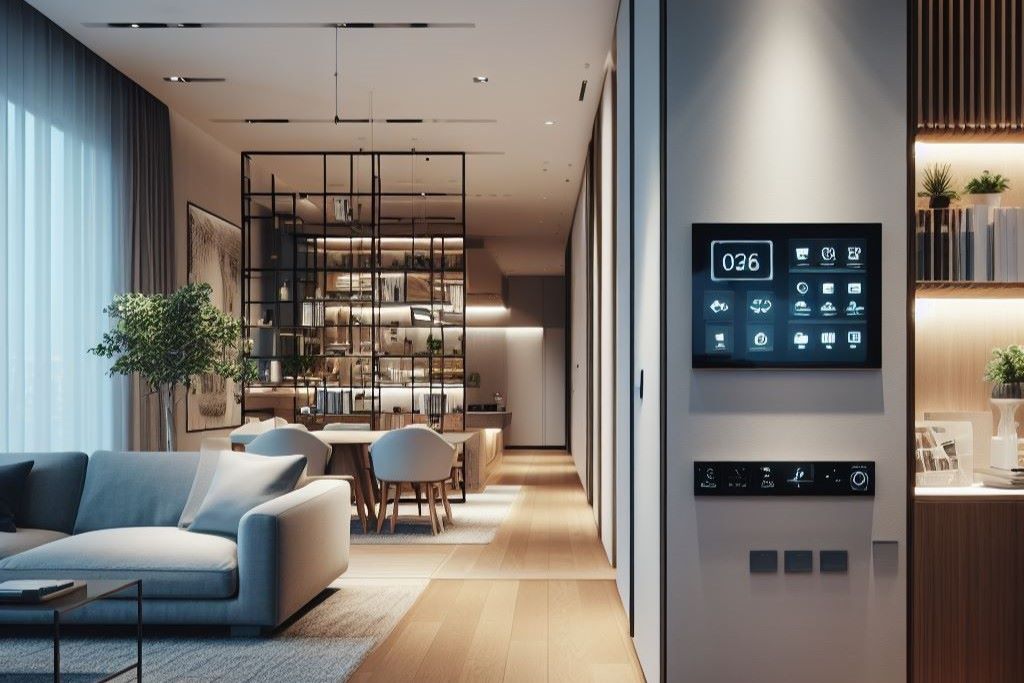
How does smart home technology make daily life more efficient?
Home automation streamlines tasks through programmed scenes and schedules, simplifying daily routines and increasing energy efficiency. By integrating smart devices and systems, homeowners can control and automate lighting, heating, cooling, security, and other appliances with the touch of a button or a voice command.
For example, a “morning” scene can be set to gradually wake up the household by adjusting the thermostat, turning on lights, and brewing coffee, all at a specific time each day. In the evening, a “goodnight” scene can be programmed to turn off all lights, arm the security system, and adjust the thermostat for sleep.
By scheduling these scenes and automating tasks, homeowners can save time and reduce energy waste. For example, lights and appliances can be turned off automatically when not in use, and heating and cooling systems can be optimized to reduce energy consumption. Home automation also provides peace of mind by allowing remote monitoring and control of the home’s security and energy usage.
What are the key components of a comprehensive home automation system?
Key components include smart thermostats, security systems, lighting control, and integrated smart devices for convenience and comfort.
- Smart thermostats allow for automated temperature control and can also learn and adapt to household preferences over time.
- Security systems provide users with the ability to remotely monitor and control their home’s security, including cameras, door locks, and alarms. This can give homeowners peace of mind and added protection against potential threats.
- Lighting control allows for automated or remote control of lights throughout the home, creating a more energy-efficient and convenient environment. This can also enhance security by allowing users to schedule lights to turn on and off while away from home.
- Integrated smart devices, such as voice assistants, smart speakers, and smart appliances, can further enhance convenience and comfort by allowing for seamless control and automation of various aspects of the home.
Overall, these key components work together to create a smart home environment that prioritizes comfort, convenience, energy efficiency, and security.
Building the Future: The Role of Smart Home Technology
How is smart home technology integrated into the construction process?
Smart home technology is integrated early in the construction process, ensuring seamless connectivity and efficient operation.
Integrating smart home technology during the construction process ensures that wiring and infrastructure are in place for seamless connectivity and operation. This prevents the need for costly and disruptive retrofitting in the future. It also allows for a more streamlined and cohesive system, as all components are designed to work together from the start.
Smart home technology can also enhance the overall value of a property, as it is an attractive feature for many homebuyers. It offers convenience, energy efficiency, and security, making it a desirable addition to any home. By integrating smart home technology early in the construction process, homeowners can enjoy the benefits of a connected and efficient home from day one.
What are the standard features that make a home “smart” from the ground up?
As discussed above, standard features include connected smart home devices, home automation systems, and IoT integration for a comprehensive smart home experience.
The Intelligent Thermostat: Optimizing Comfort and Energy Efficiency
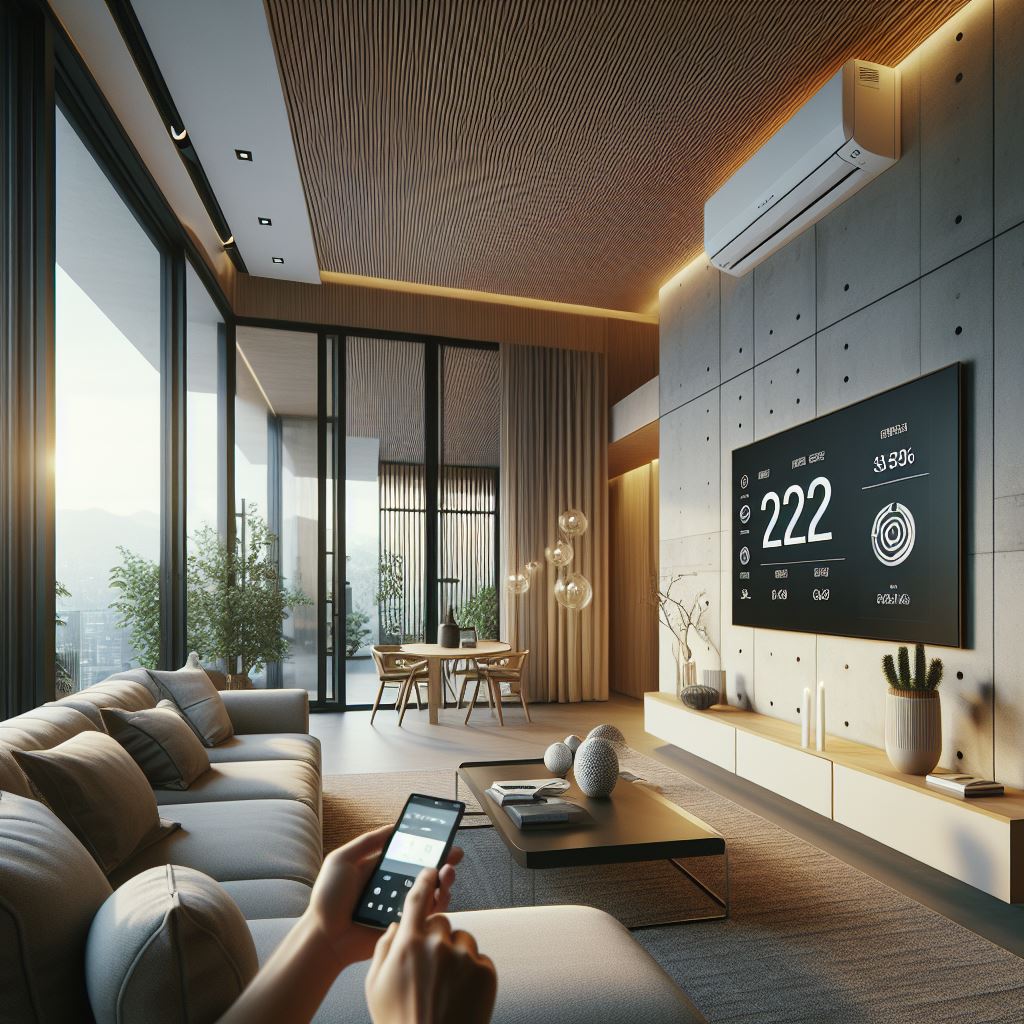
Why is the smart thermostat a game-changer in home design?
The smart thermostat allows homeowners to efficiently regulate temperature, reducing energy consumption and enhancing comfort.
The smart thermostat utilizes advanced technology to learn and adjust to the homeowners’ preferences and schedules, automatically optimizing energy usage. This not only helps reduce utility bills but also minimizes environmental impact by lowering overall energy consumption.
With mobile integration, homeowners can easily monitor and control their home’s temperature settings from anywhere, giving them greater control and flexibility. Additionally, the smart thermostat can provide valuable insights into energy usage patterns, allowing homeowners to make informed decisions about their cooling and heating needs.
How does it contribute to energy efficiency and a comfortable living environment?
By learning household patterns and adjusting settings accordingly, smart thermostats optimize energy usage and maintain a comfortable environment.
Security Reinvented: Smart Home Security Systems
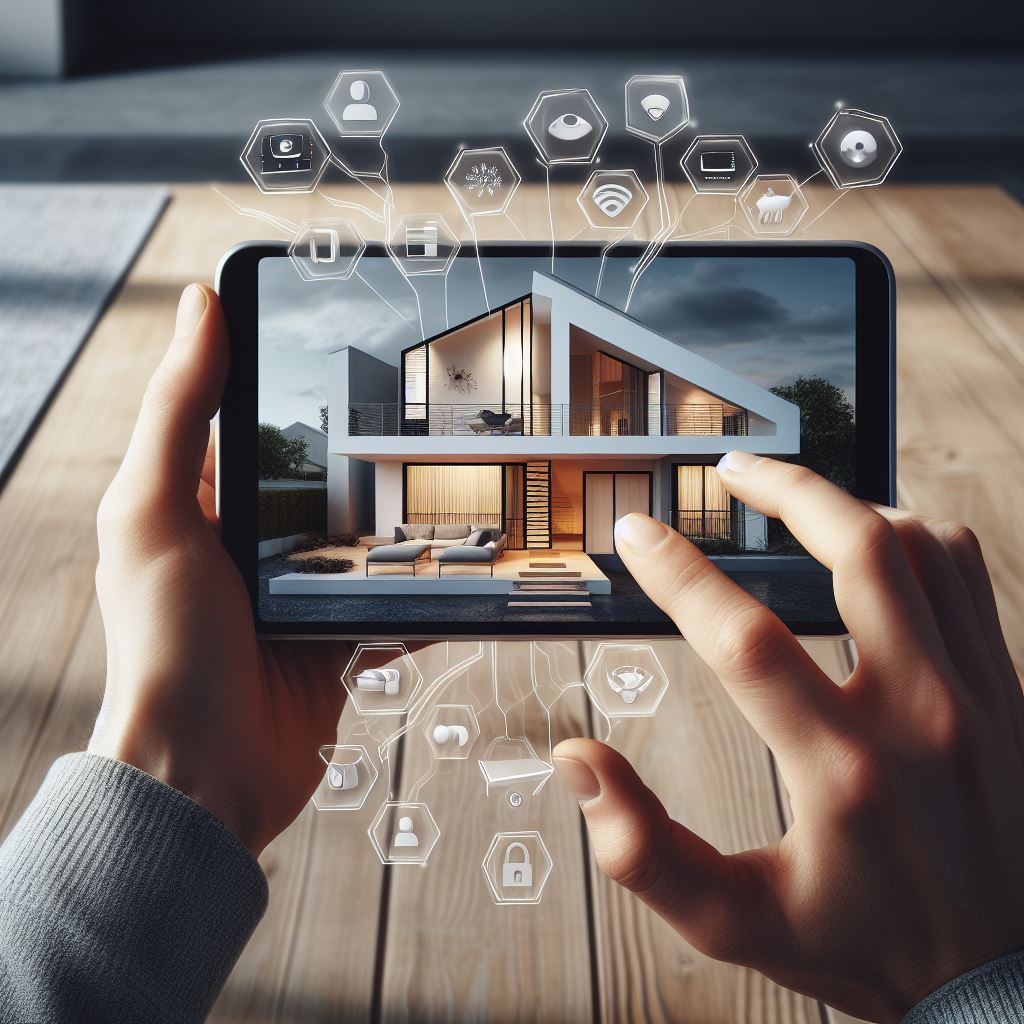
What sets smart security systems apart from traditional security measures?
Smart security systems offer advanced features including security sensors, smart AI enabled cameras, notification systems, and smart locks for enhanced protection and convenience.
- With smart security sensors, homeowners can detect unauthorized entry or movement within their property. These sensors can be placed on doors, windows, and other vulnerable areas to alert homeowners of potential threats.
- Smart AI enabled cameras offer high-definition video surveillance and can even be programmed to recognize familiar faces or detect unusual activity. These cameras can also be accessed remotely, allowing homeowners to monitor their property from anywhere.
- Notification systems provide real-time alerts to homeowners’ smartphones or other devices, keeping them informed of any potential security breaches. This allows homeowners to take immediate action in the event of an emergency.
- Smart locks offer convenient access control, allowing homeowners to lock and unlock their doors remotely using a smartphone app. This feature also allows for temporary access codes to be given to authorized individuals, adding an extra layer of security.
Smart security systems offer a comprehensive and convenient way to protect one’s home and loved ones, utilizing advanced technology to provide peace of mind.
How do sensors and notification systems enhance home security?
Sensors detect potential threats while notification systems alert homeowners, providing real-time information on their phones and peace of mind.
Innovative Living: The Smart Kitchen Experience
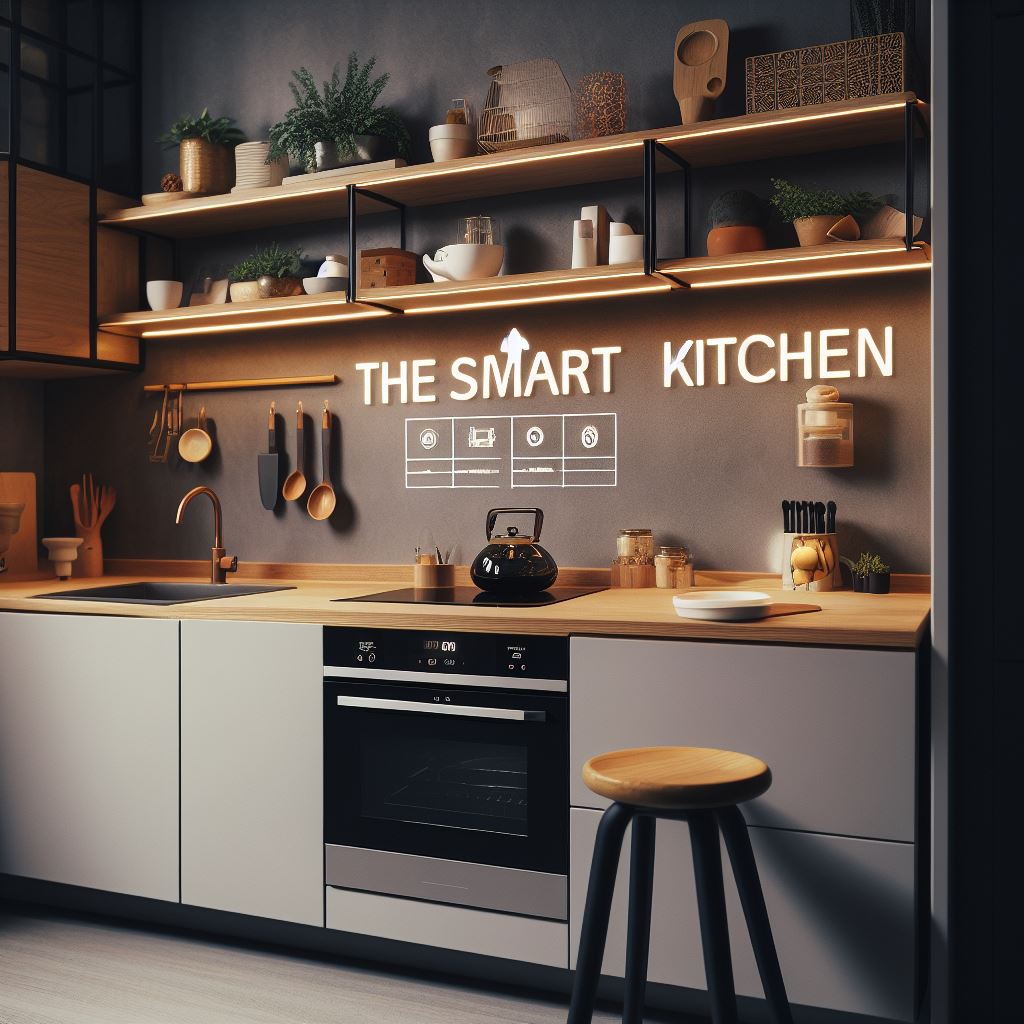
How does a smart kitchen redefine the cooking experience?
Smart kitchens feature connected appliances and devices that streamline cooking tasks, enhance efficiency, and offer personalized experiences. Some common features of smart kitchens include:
1. Connected appliances: Smart refrigerators, ovens, dishwashers, and other appliances can be connected to the internet and controlled remotely through a smartphone or voice commands. This allows users to preheat the oven, adjust the temperature of the refrigerator, or start the dishwasher from anywhere.
2. Voice control: Many smart kitchens feature voice-activated assistants, such as Amazon Alexa or Google Assistant, that can help users with cooking tasks, create shopping lists, and provide recipes and cooking instructions.
3. Energy efficiency: Smart appliances can optimize energy usage by adjusting settings based on usage patterns and demand. For example, a smart thermostat can regulate the temperature of the refrigerator and freezer to minimize energy consumption.
4. Personalized experiences: Smart kitchen devices can learn user preferences and adapt to individual cooking habits. For example, a smart oven can remember preferred cooking times and temperatures for specific dishes, making cooking more efficient and hassle-free.
5. Integration with smart home systems: Smart kitchens can be integrated with other smart home devices, such as lighting, security systems, and entertainment systems. This allows for a seamless and cohesive connected home experience.
6. Recipe and meal planning assistance: Smart kitchen devices can provide recipe suggestions based on available ingredients, dietary preferences, and nutritional needs. They can also help with meal planning and grocery shopping by creating shopping lists and suggesting meals based on what’s in the pantry.
Smart kitchens are designed to make cooking and meal preparation more convenient, efficient, and enjoyable for users. They can save time and energy, reduce food waste, and enable a more connected and personalized cooking experience.
What smart devices and technologies are integrated into modern kitchens?
Modern kitchens incorporate smart appliances, voice-command features, and IoT connectivity for convenience and control.
The Rise of Smart Lighting Systems
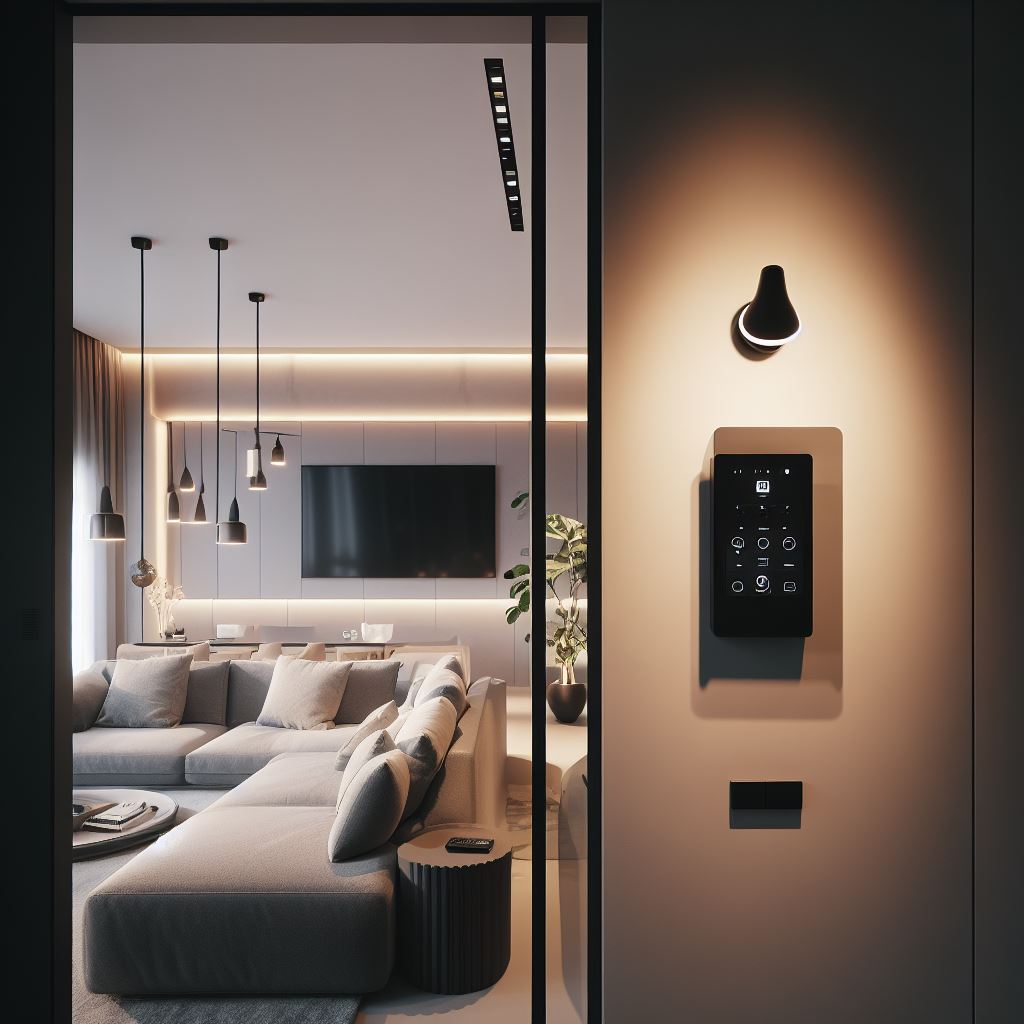
How do smart lighting systems contribute to energy efficiency and ambiance?
Smart lighting systems optimize energy usage, offer customizable ambiance, and provide convenient control through automation and smart devices. These systems utilize LED technology to reduce energy consumption and can be programmed to adjust lighting levels to match natural sunlight patterns, further saving energy. They can also be integrated with motion sensors or smart home devices to automatically turn lights on and off based on occupancy or time of day.
Smart lighting systems can also create customized ambiance by allowing users to adjust the color and intensity of the light to fit their needs or mood. Whether it’s a calming warm light for relaxation or a bright white light for working, smart lighting can easily provide the perfect level of illumination.
Furthermore, these systems offer convenient control through automation and smart devices. Users can schedule lighting to turn on and off at specific times, create custom lighting scenes for different activities, and even control lights remotely through their smartphone or voice commands.
A smart lighting system offers numerous benefits such as energy saving, personalized ambiance, and convenient control, making it a popular choice for both residential and commercial spaces.
What are the key benefits of integrating smart lighting into home construction?
Integrated smart lighting enhances energy efficiency, supports wellness through circadian lighting, and creates personalized lighting experiences.
Notification Systems: Staying Connected and Informed
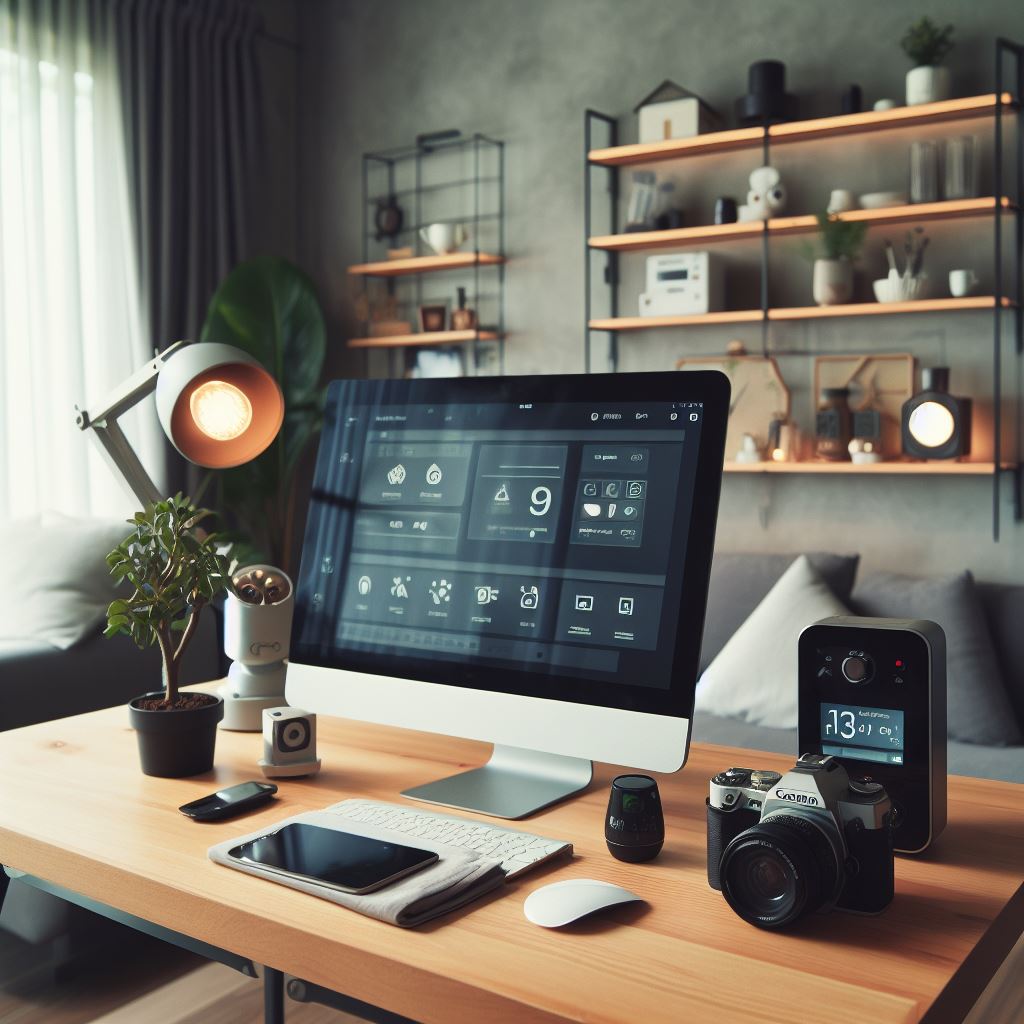
How do smart homes keep homeowners informed through notification systems?
Smart homes use notification systems to provide real-time updates on security, energy usage, and home maintenance, keeping homeowners connected and informed.
These notification systems can alert homeowners to potential security breaches, such as when a door or window is left open or when motion is detected outside the home. They can also send alerts about unusual energy usage, helping homeowners identify potential issues with their HVAC system or appliances.
Additionally, notification systems can remind homeowners about routine home maintenance tasks, such as changing air filters or scheduling a routine service for their heating and cooling system.
By providing real-time updates and alerts, smart home notification systems help homeowners stay on top of their home’s security, energy efficiency, and maintenance needs, ultimately providing peace of mind and convenience.
What aspects of daily life can be improved through timely notifications?
Timely notifications enhance home security, energy efficiency, and overall convenience, ensuring that homeowners are informed and in control of their living environment.
Custom Homes, Smart Living: Tailoring Technology to Your Needs
How can smart home features be customized to meet individual preferences?
Homeowners can personalize smart home systems, selecting features and customizing settings to align with their unique lifestyle and preferences. Some popular features that home owners will need in a smart home system include:
1. Lighting control: Homeowners can set up automated lighting schedules or adjust the brightness and color of lights to create the desired ambiance.
2. Thermostat control: Smart thermostats allow homeowners to set temperature schedules, adjust settings remotely, and receive energy-saving recommendations.
3. Security system settings: Homeowners can customize their security system by setting up specific alerts, adjusting camera angles, and integrating other smart devices like smart locks or doorbell cameras.
4. Entertainment options: Smart home systems can be personalized to integrate with TVs, speakers, and other entertainment devices, allowing homeowners to control music, TV shows, and movies with their voice or a smartphone.
5. Automated routines: Homeowners can create personalized routines that automate certain tasks, such as turning on lights at a specific time or adjusting the thermostat before bedtime.
6. Voice assistant preferences: Smart home systems often include voice assistants like Amazon Alexa or Google Assistant, and homeowners can customize these assistants to respond to specific voice commands or perform personalized tasks.
By personalizing these features and settings, homeowners can create a smart home environment that aligns with their individual needs and preferences, making their daily routines more convenient and enjoyable.
What role do homeowners play in shaping the smart technology within their homes?
Homeowners are integral in choosing and configuring smart technologies, ensuring that the home’s features match their specific needs. Whether it’s a smart thermostat, security system, or home automation system, homeowners play a key role in selecting and customizing these technologies to suit their lifestyle and preferences. They can choose features that improve energy efficiency, enhance security, or simply make everyday tasks more convenient.
Conclusion: Embracing Smart Living for a Better Tomorrow
In conclusion, the essence of smart home construction extends far beyond the realm of technology; it’s a profound transformation in the way we experience life within our homes. Emerging as a standard feature in newly constructed residences, smart technologies serve as a window into the future of living. With a focus on energy efficiency and curated, personalized experiences, the advantages of embracing smart living are indeed vast. It’s an invitation to join the revolution, enabling your home to evolve into a genuinely smart, connected, and highly efficient living space.
The infusion of the internet of things (IoT) has elevated the concept of smart homes, with an array of cutting-edge features and innovations. As the first smart homes emerge, they set the precedent for a new era in residential living. These residences not only make the home a smart-home but also embody the vision of a dream home where technology seamlessly integrates with daily life, making it more intuitive, comfortable, and enjoyable.
In the landscape of smart-home construction, the incorporation of many smart home devices becomes a defining characteristic. These devices, ranging from smart appliances to systems and devices that connect to your mobile device, are becoming increasingly popular. Access points within the home serve as hubs for a variety of smart technologies, fostering a network where safety and security are paramount.
Temperature and lighting control, fundamental aspects of smart living, are intelligently managed by systems available within these technologically advanced homes. These systems make your life more convenient by automating routine tasks, such as adjusting the temperature and lighting according to your preferences and daily activities. The result is an environment that not only enhances safety and security but also caters to the individual needs and desires of its occupants.
As smart home construction proliferates, newly built homes are at the forefront of this transformative wave. They are not merely structures but living entities that adapt to your lifestyle, offering unparalleled convenience through the integration of smart technologies. The dream home, once a vision of luxury, is now a tangible reality where smartthings and access points seamlessly connect systems and devices throughout the residence.
The role of smart home pros in this revolution is pivotal. Their expertise ensures that every aspect of the home, from home appliances to safety and security features, is optimized for efficiency and convenience. These professionals guide homeowners in making informed choices, turning their residences into havens of smart living.
In essence, embracing smart living is an investment in the future of residential living. It’s a journey where the home becomes a dynamic, responsive entity, enhancing the quality of life for its occupants. As you step into the world of smart home construction, remember that it’s not just about technology; it’s about creating an environment where your home becomes an intuitive partner, making every day more efficient, secure, and enjoyable.
Frequently Asked Questions
Q: What is a smart home and why should I consider building one?
A: A smart home is a residence that uses internet-connected devices to enable the remote monitoring and management of appliances and systems, such as lighting and cooling. Building a smart home offers convenience, energy savings, improved security, and the ability to customize your living space to fit your lifestyle.
Q: How can a builder help me create a smart home?
A: A builder with expertise in smart home construction can integrate smart technologies into the design and construction process, ensuring that your home is equipped with the necessary infrastructure and systems to support smart devices and automation.
Q: What are some popular smart home systems that I can incorporate into my new home?
A: Some popular smart home systems include smart lighting, heating and cooling controls, home security and monitoring, smart appliances, and voice-activated assistants such as Amazon Alexa or Google Home.
Q: How can I automate my home with smart technology?
A: You can automate your home by using smart devices such as thermostats, light switches, and smart plugs that can be remotely controlled or programmed to operate based on schedules or sensor inputs.
Q: What are the advantages of building a smart house with a professional home builder?
A: A professional home builder experienced in smart home construction can offer expertise in integrating smart technologies, ensure proper installation and functionality, and provide guidance on selecting the right smart home products for your specific needs.
Q: What air conditioning systems are compatible with smart home automation?
A: Air-conditioning systems compatible with smart home automation include smart thermostats, zone control systems, and occupancy sensors that can be integrated into a smart home network for efficient and customized air-conditioning management.
Q: How can I remotely control my smart home heating and cooling systems?
A: With smart technology, you can remotely control your heating and cooling systems using a smartphone app or a web interface, allowing you to adjust temperature settings and schedules from anywhere with an internet connection.
Q: What should I consider when building a smart home network?
A: When building a smart home network, it’s important to plan for a reliable and scalable infrastructure to support the increasing number of smart devices and ensure seamless connectivity throughout the home.
Q: What are some commonly used smart home products that builders need to incorporate during construction?
A: Builders need to incorporate smart switches, smart home hubs, smart door locks, smart security cameras, smart water systems, and smart entertainment systems to create a truly smart and connected living space.
Q: Why are smart homes increasingly popular among new home buyers?
A: Smart homes offer convenience, energy efficiency, enhanced security, and the ability to customize living experiences, making them highly desirable for new home buyers who seek the latest technologies and the ability to control their homes remotely.
Transform Your Dream House with the Best Architect
Transform Your Dream House with the Best Architect Company in
Read MoreUnveiling Modern Luxury House Construction Design in Lutyens
Unveiling Modern Luxury House Construction Design in Lutyens Bungalow ZoneIn
Read MoreYour Ultimate Dream Luxury House Construction in Lutyens
Your Ultimate Dream Luxury House Construction in Lutyens Bungalow ZoneImagine
Read More